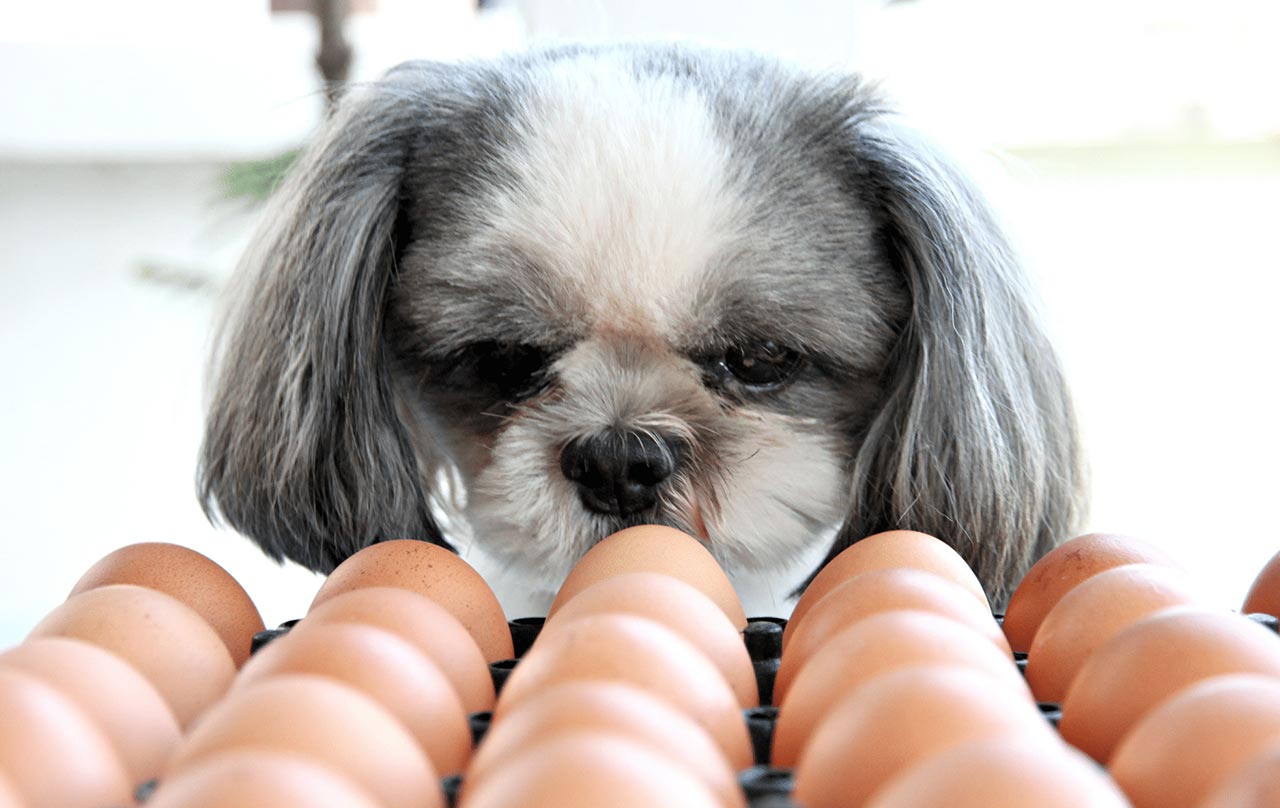Dogs Can and Should Eat Eggs
Yes. Dogs can and should eat eggs.
Eggs are high in protein and contain many essential amino acids and fatty acids. In fact, eggs are an important source of nutrition and not only for those who eat them but also for the chick living inside it. Eggs contain all the nutrients necessary to grow a new chicken. And this is why eggs are also one of the most complete sources of amino acids, the building blocks of protein. So letting your dog eat eggs is a great way to boost his protein intake.
Eggs provide many key nutrition components including:
- Vitamin A
- Riboflavin
- Folate
- Vitamin B12
- Iron
- Selenium
- Fatty Acids
- Egg Whites Contain Enzyme Inhibitors
This is true to some degree, but in reality it means that eggs should not be the mainstay of your dog’s diet. If you are feeding a well balanced fresh diet you won’t be putting him at risk.
Is it Safe to Feed Raw Eggs to Dogs?
There are a few concerns about feeding raw eggs to your dog that dog owners should be aware of:
Salmonella
Your dog is actually well equipped to handle the bacteria in raw foods. But there are a few things you want to consider when choosing your eggs to keep the bacterial levels at a normal level.
The health of the hen laying the eggs is very important. Ideally you want your dog to eat eggs from organic, free-range healthy chickens. Feeding quality eggs along with proper storage and keeping the eggs cool, will keep bacteria at a manageable level.
Biotin Deficiency
Biotin is one of the B vitamins. It supports healthy skin, digestion, metabolism, and cells.
Egg whites contain avidin which is a biotin inhibitor. It ties up biotin and prevents absorption of biotin into the body. That is why it’s feared to cause biotin deficiencies.
However, biotin deficiencies are quite rare in dogs. it would take eating an extraordinary amount of eggs to create a deficiency. Most veterinarians recommend cooking eggs before feeding them to your dog, as long as the eggs are cooked or boiled plain without oil, butter, salt, or other additives.
Meanwhile, egg yolks are very high in biotin. So as long as you feed the entire egg, there are few worries. When you feed a complete fresh diet there are other good sources of biotin in his diet as well. And here’s an additional fact, Liver is actually a good source too.
Can Dogs Eat Eggshells?
Yes, dogs can eat eggshells! Even small dogs can use their teeth and jaws to happily crunch through the shell. Although, the pickier amongst our canine friends will likely choose the white and yolk and discard most of the shell.
Feeding dogs a whole cracked egg with the shell is a nearly a complete food source. They have almost all the amino acids dogs need to stay healthy. And whole eggs are also a balanced source of calcium and phosphorus, which dogs need to grow healthy bones and teeth.
Another interesting thing is that eggshells also have a thin membrane on the inside which is incredibly beneficial to dogs.
Eggshell membranes are full of:
- Glucosamine
- Hyaluronic acid
- Chondroitin
- Collagen
Did you know?
In a 2016 study, eggshell membranes significantly reduced joint pain in 51 dogs with varying joint issues. This makes it a great choice for arthritis in dogs.
While you can peel off the membrane and feed it to your dog directly, it’s much easier to feed the whole egg. I like to pierce or slightly crack the shell to get them started and it makes for a great enrichment treat (I very much recommend you feed this outside!).
Eggshells can also be valuable for dogs who have difficulty eating bones. Just dry your eggshells out in the oven (90 degrees for around 1 hour) then grind them in a clean coffee grinder or high powered blender like a Vitamix until they’re powdered. You can then sprinkle 1/2 teaspoon of powder on your dog’s next meal to boost calcium.
Eggshells are also safe for puppies to eat but they aren’t a good source of calcium for them. Puppies need lots of calcium in their diets to build strong bones. But the calcium in shells is calcium carbonate, which they couldn’t absorb well. Eggshell powder is also missing magnesium and phosphorus.
Fresh raw bone is still the best source of calcium for puppies. If you don’t want to bone or your puppy struggles with them, you can feed your puppy grass-fed bone meal as a calcium supplement.
How To Add Eggs To Your Dog’s Diet
There are plenty of ways to feed eggs to your dog. You can cook them, hard boiled, scrambled, fried, poached, and so forth, or even serve them raw. You can make omelets for you and your dog to share; just don’t add ingredients that can harm a dog (such as onions, chives and garlic) and go light on the salt and pepper.
Eggs are a perfect binder when added to warm oatmeal or rice. You can use them for a meal topper. Make sure you take into account the calories in an egg before supplementing your dog’s food.
In fact, the average dog can eat several eggs a week and be perfectly safe. You can start by feeding your dog just one egg. If you don’t see evidence of digestive upset, then he should have no trouble with eggs as part of his regular diet.
Cooking the egg white will help to avoid this problem, but most of the nutrition will get cooked out. So feed them raw if you can.
Make sure you ask your veterinarian first about how many eggs you can feed your dog per day because overfeeding may result in obesity and other health issues.


